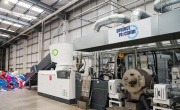Circular economy commitment in Industrial Strategy welcomed by industry
The waste and resources industry has responded positively to the government’s Industrial Strategy white paper, published yesterday (27 November) by the Department for Business, Energy and Industrial Strategy (BEIS), which sets out a ‘long-term vision’ for the UK’s economic future, and contains a number of commitments relevant to the sector.
The Industrial Strategy points to ambitions outlined previously in October’s Clean Growth Strategy, and further strengthens the government’s commitment to zero avoidable waste and doubling resource productivity by 2050. Clean growth is identified as one of the four ‘Grand Challenges’ facing the UK, and also as an opportunity to transform the resource productivity of domestic industry through ‘innovative approaches to resource efficiency’.
The paper also sets out a commitment to ‘working towards a more circular economy’, to be achieved by maximising the value extracted from resources, promoting recycling and developing a stronger secondary materials market in the UK.
This commitment has been welcomed by the waste and resources industry, with Ray Georgeson, Chief Executive of the Resource Association, commenting: “It is encouraging to see government now promoting the circular economy and greater resource productivity as important features of the Industrial Strategy and we are pleased to see that our industry’s calls for greater recognition have not gone unheard.”

Jacob Hayler, Executive Director of the Environmental Services Association, agreed: “ESA is pleased the Industrial Strategy white paper recognises the importance of maximising the value we extract from our resources. Strengthening markets for secondary materials and encouraging design for recyclability are imperative if we are to move to a circular economy, and we welcome the government’s commitment to this."
Waste and resources strategy will be ‘key’
Looking to future government publications, Hayler continued: “The forthcoming resources and waste strategy must set out a clear long-term plan for how this can be achieved, and must put in place the right policy levers to ensure we have the right infrastructure to deliver greater resource productivity for the benefit of the UK economy and environment.”
CIWM’s CEO, Dr Colin Church, concurred, adding that while more detail would have been welcome, it was “reassuring” to see the government’s continued commitment to releasing a new and more in-depth strategy for waste and resources, as well as the long-awaited 25-year Environment Plan.
“These are shaping up to be absolutely key documents for our sector and the wider environment”, Church said, “and we look forward to seeing how government intends to make a reality of its desire to ‘strengthen the markets for secondary raw materials’.
“Better planning for waste and waste-derived resources around the country, especially to provide sufficient capacity of the right kind in the right place to support local economic development, is a key ask. The economic and low carbon benefits of secondary resources derived from waste could be better realised and exploited in local economic development planning.”
Call for collaboration
For many, the strategy has highlighted a need for collaboration within the industry, as well as between government and businesses, in order to realise its ambitions. David Palmer-Jones, CEO of SUEZ Recycling and Recovery UK, said: “The government’s commitment to moving towards a regenerative circular economy is the right step towards making a more productive Britain.
“We now need to work with BEIS to promote well-functioning markets for secondary raw materials, the key foundation for the UK’s ability to create a low-carbon, resource efficient economy. Our industry will partner with a range of businesses to increase their recycling and to aid their greater use of quality secondary raw materials all the way along the supply chain. It is essential we work alongside manufacturers to help them innovate.”
Georgeson also commented on the collaborative role industry can play: “The challenge now is for government to harness the hunger and commitment of our industry to shape this new policy landscape. We stand ready to play our part in securing a future resources policy that places the circular economy centre stage, prizes quality recycling and delivers the sustainable manufacturing growth utilising recovered materials that we need if we are achieve greater resource productivity ambitions.
“The Industrial Strategy sets out some important criteria for successful Sector Deals, including strong elements of unity, leadership and inclusiveness from sectors seeking to establish such deals. We remain committed to this approach and look to others to collaborate with similar intent.”
Praise from AD industry
The paper also points to the new Bioeconomy Strategy, due early in 2018, which will ‘set out a framework for growth in the sector to develop new low-carbon bio-based products andprocesses’. In response, Charlotte Morton, Chief Executive of the Anaerobic Digestion and Bioresources Association (ADBA), has highlighted the role that Anaerobic Digestion (AD) can play in helping deliver the strategy’s ambitions towards more sustainable and circular agricultural practices.

Morton said: “We’re encouraged to hear that the government will increase incentives for investment in sustainable agriculture to help grow markets for innovative technologies and techniques. AD is clearly one such technology, so we look forward to further details on this support.
“The government is also right to highlight the benefits of moving towards a more circular economy in which resources are used more efficiently, and a dedicated Bioeconomy Strategy is an important step forward in this regard. As the only recycling option for organic wastes, AD can reduce emissions from waste and turn these wastes into the resources that the UK economy desperately needs.
“The government now needs to follow up on this promising white paper with concrete support for the AD sector so it can deliver its huge potential across the UK.”
The full Industrial Strategy white paper can be read on the government’s website.







